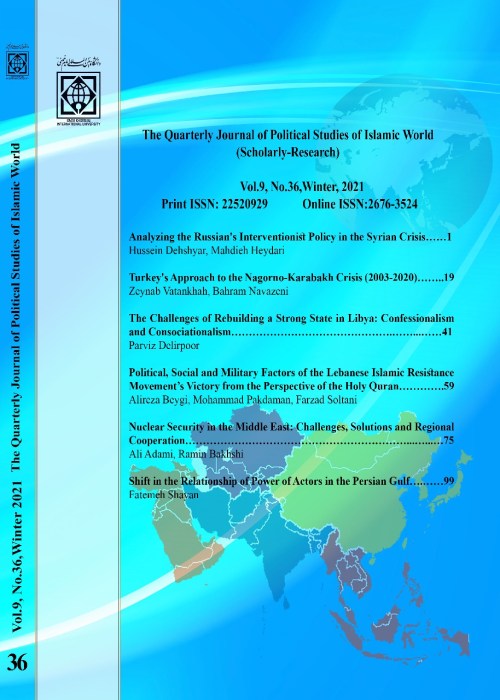Assessment of geopolitical dispute in the Persian Gulf region (Example of internal dispute in the Islamic world)
Author(s):
Article Type:
Research/Original Article (دارای رتبه معتبر)
Abstract:
Objective
The purpose of this study is to investigate the geopolitical differences in the Persian Gulf region. Today, the Persian Gulf is known as one of the most important geopolitical areas in the world. The geo-economic importance of the region due to the existence of energy resources, good communication position and geopolitical structure of the region has led to historical and civilizational differences between the countries of the region as well as differences between trans-regional countries in relations with countries.Method
The method of this research is "applied" in terms of purpose and "descriptive-analytical" in terms of nature. Using John Coliner's theory, which focuses on geopolitical differences, this study seeks to answer the question of what factors and components lead to geopolitical differences in the Persian Gulf region?Results
The findings of the study indicate geopolitical differences in the Persian Gulf region in the dimensions of territorial disputes (claims and disputes over borders, land and maritime territories), strategic disputes (disputes between countries over strategic places and points such as Arvand River, Abu Musa and the Strait of Hormuz), economic disputes (disputes over energy resources and common offshore fields), environmental disputes (disputes over the marine environment and water scarcity in the region) and cultural disputes (historical-civilizational disputes and Ethnicity) which has led to competition and geopolitical tensions in the relations of the countries of the region and the involvement of supra-regional powers in the Persian Gulf region.Conclusion
The results of the study indicate the geopolitical differences between the countries of the Persian Gulf region include five dimensions: "territorial, economic, strategic, cultural and environmental". The most important consequences of these differences are "failure to form a comprehensive regional organization", "lack of collective security approach", "First and Second Persian Gulf Wars", "geopolitical rivalries" and "proxy wars" are present.Keywords:
Language:
Persian
Published:
A Quarerly Journal of Political Studies of Islamic World, Volume:11 Issue: 43, 2022
Pages:
53 to 70
magiran.com/p2575468
دانلود و مطالعه متن این مقاله با یکی از روشهای زیر امکان پذیر است:
اشتراک شخصی
با عضویت و پرداخت آنلاین حق اشتراک یکساله به مبلغ 1,390,000ريال میتوانید 70 عنوان مطلب دانلود کنید!
اشتراک سازمانی
به کتابخانه دانشگاه یا محل کار خود پیشنهاد کنید تا اشتراک سازمانی این پایگاه را برای دسترسی نامحدود همه کاربران به متن مطالب تهیه نمایند!
توجه!
- حق عضویت دریافتی صرف حمایت از نشریات عضو و نگهداری، تکمیل و توسعه مگیران میشود.
- پرداخت حق اشتراک و دانلود مقالات اجازه بازنشر آن در سایر رسانههای چاپی و دیجیتال را به کاربر نمیدهد.
In order to view content subscription is required
Personal subscription
Subscribe magiran.com for 70 € euros via PayPal and download 70 articles during a year.
Organization subscription
Please contact us to subscribe your university or library for unlimited access!


